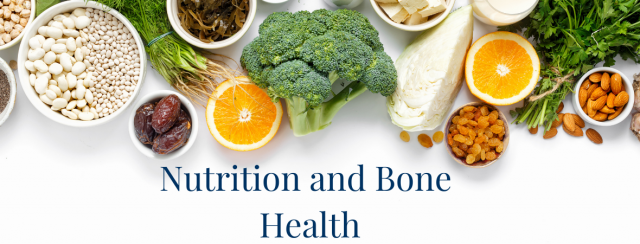
Nutrition for Bone Health and Osteoporosis
Food and drinks have a very important role in both the prevention and treatment of osteoporosis. This is because the nutrients and minerals we obtain from food are part of what makes up our bone structure.
So which nutrients should we be focusing on to protect bone health, and which foods should we aim to limit?
Here’s our dietitian’s top recommendations:
Nutrients to benefit bone health
Calcium
Essential for strong bones and teeth, almost 99% of the calcium in our bodies forms the structural component to our bones and skeletal system. If calcium levels in the blood drop, the body will restore them by drawing calcium from the bones. When there is not enough calcium consumed from the diet, your body will withdraw calcium from bones. Over time this can reduce bone mineral density and increase the risk of brittle bones and osteoporosis.
How much calcium do you need?
The Recommended Dietary Intake (RDI) for adults (aged 19-50 years) is 1000mg per day. For post-menopausal women over 50 years, this target increases to 1300mg per day due to reduced levels of hormones which protect bone health (such as oestrogen) and the effect of aging on bone health. For men over 70 years old, the RDI also increases to 1300mg per day.
Best food sources of calcium:
Where possible it’s best to obtain calcium from dietary sources, as you are much less likely to consume excessive (toxic) amounts of calcium from food than supplements.
Sources of calcium which have good bioavailability (meaning they are absorbed well in the body) include:
- Dairy foods such as milk, yoghurt, cheese, kefir (aim for unsweetened dairy products)
- Calcium fortified plant-based milks*
- Tinned sardines and salmon with bones
- Calcium-set tofu
- Vegetables such as bok choy, kale and broccoli
- Some whole grains, nuts & seeds such as amaranth, sesame seeds, poppy seeds, chia seeds, almonds and white beans
*ensure to shake the bottle of fortified plant based milks before pouring as some studies suggest the fortified calcium can separate to the bottom on the bottle
Vitamin D
Vitamin D assists bone health as it helps the body absorb calcium, improves strength and repair of muscles and reduces inflammation.
The major source of vitamin D is sunlight. For most people 15 minutes of sun exposure at midday is a sufficient amount of time to obtain adequate vitamin D.
The amount of vitamin D considered to be adequate for adults aged 19-50 is 5 micrograms daily. For adults aged 50-70 10 micrograms per day is recommended and for those over 70 15 micrograms is recommended.
Top food sources of vitamin D:
- Oily fish (salmon, sardines, tuna, mackerel)
- Eggs
- Mushrooms (tip place mushrooms outside in sunlight to increase their vitamin D content)
- Fortified foods such as milk, dairy products and cereals
Need help with your Nutrition? Book with our Dietitian and Nutritionist Rebecca below
Vitamin K
Vitamin K is another important nutrient for health bones as it helps deliver calcium to the bones.
Vitamin K is found in large amounts in dark leafy green vegetables (broccoli, kale, spinach, parsely) and also in fish, red meats, liver and eggs.
Magnesium
Magnesium is a mineral found in large amounts in the bones, therefore it assists in the structural makeup of the bones.
The recommended dietary intake of magnesium is between 400-420mg for males and 310-320mg for females.
Magnesium is found in a number of nutritious foods including:
-green vegetables
-nuts and seeds
-legumes
-cocoa and dark chocolate
Eating enough for your body’s needs
Several hormones in the body play an important role in protecting bone health. It is particularly important for athletes and active individuals to ensure they are eating enough food to support the body’s production of these hormones. When someone does not eat enough food to match the amount of energy they use through exercise and day-to-day activities (ie. low energy availability), this can lead to reductions in hormone levels. Long term effects of this can include low bone mineral density and increased risk of fractures and osteoporosis.
A dietitian can support you to ensure your diet provides sufficient food and nutrients to protect bone health. Send us an email to get started with bone health nutrition to support your exercise and lifestyle with our dietitian today.

